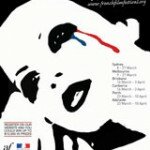Kicking off the BigPond Adelaide Film Festival for me this year was Home, a quirky, interesting and intense Swedish/French feature film. Directed by Ursula Meier, Home tells the story of a family of five living a quaint and pleasant lifestyle in the French countryside next to an unused stretch of highway. This piece is road is central to the film and at first is another piece of the family’s yard and they use it as such, as though it belongs to them. The family are very happy and comfortable, to the point that it seems to have a calming effect on the mother, Marthe (Isabelle Huppert).
But the peace and quiet cannot last. The construction workers march in, camera shots only showing their feet as though they were an invading army, and bring with them the enormous, noisy trucks with their flashing lights. One is made to feel that these things are evil, the ‘bad guys’, bringing a revolting contrast to the beauty and peace and a sense of impending doom. Michel (Olivier Gourmet), the father, tries in vain to deny any development will go ahead. Julien (Kacey Mottet Klein), the young son, walks around the trucks and workers as though they are an alien life-form. The morning brings with it the first of many, many cars and a feeling of paradise lost. A radio gives constant updates about how wonderful this new development is and how much easier the lives of the commuters will be, but the audience is already connected to the family and you only feel for them. This was a strange feeling for myself, generally being all for new development if it helps society in general.

The traffic gets worse and worse. The noise is unbearable, day and night. There is no escape. Numerous shots show family members just watching the never-ending stream of traffic, almost in disbelief. The family try to adjust their lifestyle and adapt to the chaos, but all end up going mad in their own way. Marthe can’t sleep, daughter Marion (Madeleine Budd) becomes obsessed with pollution and scares Julien, and eldest daughter Judith (Adelaide Leroux) runs away. Michel buys insulation and concrete bricks and imprisons them in their own home during the summer, amplifying the heat, boredom and the smallest sound. It seemed as though their lives were ebbing away, as if death was imminent, especially when Judith returned to find no way into the house. The final scene is very moving, when Marthe grabs a sledgehammer and breaks through their prison walls. The camera shot from a passing car shows all the family walking out of the house into the world again, as though awakening from their diminished state of consciousness and accepting what faces them outside. This is no longer their ideal life, but is what they have to live with.
Each character was able to develop throughout the film, showing their unique personalities and how they were affected individually and as a family unit. An interesting point to me was how much more liberal the French lifestyle is to ours, and also French cinema. There were plenty of charming moments, like when the family were sitting outside watching TV together, but also many confronting moments, including the scene where Michel was trying to get the family to leave by force. The serenity of the countryside was often contrasted with the harsh highway sights and sounds to show how terrible the situation had become. I couldn’t help but feel quite fearful towards the end of the film that the family were all going to die inside those walls, making that final scene one of joy but also relief.
Verdict:
Home presents a very interesting view of how quickly and easily life can change and how hard it can be to adapt, and how development always has a downside. These points were accentuated and amplified throughout the film to capture the audience and gain their empathy. I certainly became engrossed in what was a fascinating, touching, confronting and enjoyable film.
Home screens apart of the 2009 Bigpond Adelaide Film Festival.
Tickets are still available for a second and third screening on the 23rd Feb at 3:15pm and 28th Feb at 7:45 pm at Palace cinemas, Adelaide city. For more information, visit the BAFF website here.
For more reviews and features from the Bigpond Adelaide Film Festival, visit the page devoted to our coverage here.







![Three Monkeys [Üç maymun] (Review) Three Monkeys [Üç maymun] (Review)](/wp-content/uploads/film_5232-150x150.jpg)








![The Girl with the Dragon Tattoo [2011] (Review)](/wp-content/uploads/girl-with-dragon-tattoo-2011-poster11-e1326691158273-150x150.jpg)